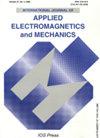利用基于tfet的节能STT-MRAM电池技术
IF 0.7
4区 工程技术
Q4 ENGINEERING, ELECTRICAL & ELECTRONIC
International Journal of Applied Electromagnetics and Mechanics
Pub Date : 2023-06-30
DOI:10.3233/jae-220300
引用次数: 0
摘要
自旋转移转矩磁随机存取存储器(STT-MRAM)已被证明是片上存储技术的主要候选。在这项工作中,利用双势垒磁隧道结(DMTJ)来定义电路级(即位元级)的stt - mram。基于dmtj的位单元采用隧道fet技术构建,并针对校准的10纳米finfet技术模型进行基准测试。STT-MRAM位单元在超低电压域中工作,并根据能效和面积进行评估。仿真结果表明,从能量延迟积(EDP)的角度来看,隧道场效应管是最节能的方案。定量地说,与基于finfet的设计相比,基于tfet的位单元的EDP降低58%,延迟提高40%,写入能量降低34%。最后,还进行了泄漏分析,表明基于tfet的STT-MRAM位单元与基于finfet的位单元相比具有更低的泄漏电流。本文章由计算机程序翻译,如有差异,请以英文原文为准。
Exploiting TFET-based technology for energy-efficient STT-MRAM cells
Spin-transfer torque magnetic random-access memory (STT-MRAM) has been demonstrated to be a leading candidate for on-chip memory technology. In this work, double-barrier magnetic tunnel junction (DMTJ) is exploited to define STT-MRAMs at the circuit-level (i.e. at the bitcell level). The DMTJ-basedbitcells are built from tunnel-FET technology and benchmarked against a calibrated 10 nm-FinFET technology model. STT-MRAM bitcells operate in the ultra-low voltage domain, and are evaluated in terms of energy-efficiency and area. Simulation results points out that the tunnel-FET based solution is the most energy-efficient alternative, in terms of energy-delay-product (EDP), when evaluated at the 6𝜎 corner. Quantitatively, when compared against the FinFET-based design, the TFET-based bitcell exhibits 58% lower EDP, 40% better delay and 34% reduced writing energy. Finally, a leakage analysis was also carried out, showing that TFET-based STT-MRAM bitcells have lower leakage current as compared to the FinFET-based counterpart.
求助全文
通过发布文献求助,成功后即可免费获取论文全文。
去求助
来源期刊
CiteScore
1.70
自引率
0.00%
发文量
100
审稿时长
4.6 months
期刊介绍:
The aim of the International Journal of Applied Electromagnetics and Mechanics is to contribute to intersciences coupling applied electromagnetics, mechanics and materials. The journal also intends to stimulate the further development of current technology in industry. The main subjects covered by the journal are:
Physics and mechanics of electromagnetic materials and devices
Computational electromagnetics in materials and devices
Applications of electromagnetic fields and materials
The three interrelated key subjects – electromagnetics, mechanics and materials - include the following aspects: electromagnetic NDE, electromagnetic machines and devices, electromagnetic materials and structures, electromagnetic fluids, magnetoelastic effects and magnetosolid mechanics, magnetic levitations, electromagnetic propulsion, bioelectromagnetics, and inverse problems in electromagnetics.
The editorial policy is to combine information and experience from both the latest high technology fields and as well as the well-established technologies within applied electromagnetics.

 求助内容:
求助内容: 应助结果提醒方式:
应助结果提醒方式:


